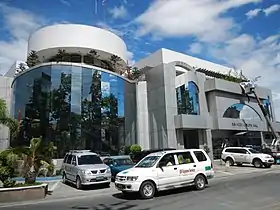UV Express
UV Express (formerly known as FX, Metered Taxi, and GT Express) is a license to operate utility vehicles, particularly vans, as an alternative mode of public transportation in the Philippines. The term also refers to the vehicles themselves. This is one of the two types of share taxi services in the Philippines with the bus-like Jeepney. There is new law about transport franchising. Transport Cooperative thru the government office of the Cooperative Development authority.

History
.jpg.webp)
In 1993, Toyota Motor Company in the Philippines introduced the third generation Tamaraw FX. This vehicle was designed and marketed as a smaller type of utility vehicle (as compared to the larger utility vehicles in countries like the United States). The Tamaraw FX could basically seat a driver and one passenger in front, three passengers in the second row, with a relatively large space left for luggage. This luggage space, however, has traditionally been used by operators to provide additional seating space, producing a rather limited legroom. This vehicle, as well as comparable offerings from other automobile manufacturers such as Mitsubishi with its Adventure and Isuzu Motors with its Hi-Lander (later Crosswind), would eventually be used as a form of public transport, colloquially referred to as the "FX".
Over time, the FX has been replaced by larger vehicles such as the Nissan Urvan, and the Toyota HiAce. With these new vehicles, the luggage space has been fully removed to add seating space, with the same limited legroom as the first ones, which has been a cause for complaints of overloading.
Company and routes

UV Express follows the franchisee model and has more than 120 services in the Philippines including the (National Capital region).[1] The country's Land Transportation Franchising and Regulatory Board serves as the owner of the franchise.
UV Express vans and compact MPVs are air conditioned, usually seat 10–18 passengers and charge 2 Philippine pesos per kilometer (as of 2013).[2] In Metro Manila, they have their own passenger terminals in Manila, Makati (Ayala Center),[3] Pasig (SM Megamall), Mandaluyong (Starmall), Cubao, North Avenue, Centris Station, Alabang (Starmall and Festival Mall), Taguig (Market! Market!) and in similarly busy locations.[4]
The name UV stands for "Utility Vehicle".[5] It is also a pun for Uwi na (Tagalog: Let us go home).
References
- "List of Registered UV Express routes" (PDF). LTFRB – Land Transport Franchising and Regulatory Body. Retrieved September 30, 2013.
- Camus, Miguel (August 19, 2013). "LTFRB warns overcharging UV Express taxi drivers". Philippine Daily Inquirer. Retrieved September 30, 2013.
- "UV Express Terminal – Ayala center". Official website. Retrieved September 30, 2013.
- Amojelar, Darwin (August 18, 2013). "LTFRB warns UV Express operators: Don't overcharge Coastal Mall-Lawton passengers". Inter Aksyon News. Retrieved September 30, 2013.
- Mayuga, Jonathan (December 18, 2012). "Drivers stand to lose jobs with phase-out of old UV Express units–labor group". Business Mirror. Retrieved September 30, 2013.